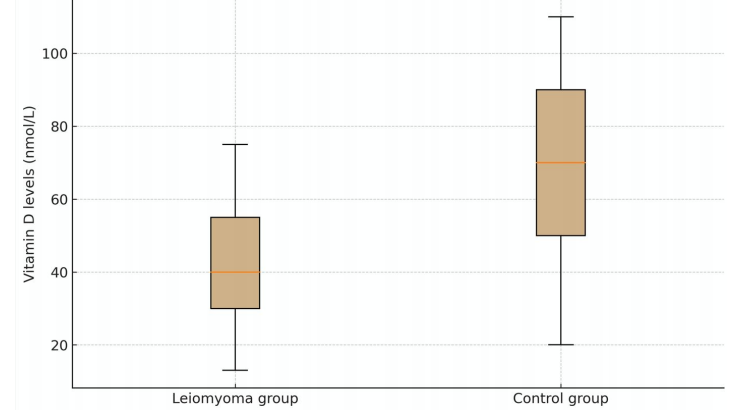Vitamin D deficiency and uterine leiomyoma in unexplained infertility
DOI:
https://doi.org/10.17305/bb.2025.12952Keywords:
Vitamin D, leiomyomas, infertilityAbstract
Uterine leiomyomas are the most common benign tumors of the female genital tract, and alongside hormonal and genetic factors, emerging evidence implicates vitamin D deficiency in their pathogenesis. We investigated the association between serum 25-hydroxyvitamin D [25(OH)D] and the presence of uterine leiomyomas in women with unexplained infertility. In this retrospective case–control study, 148 women aged 18–45 years presenting to the Infertility Clinic of Ankara Bilkent City Hospital between July 2019 and February 2024 were included: 74 had imaging-confirmed leiomyomas (non-submucosal; FIGO types 4–6) and 74 infertile controls had no leiomyomas. Serum 25(OH)D was measured and demographic/clinical data were analyzed with appropriate parametric and non-parametric tests; correlations used Spearman’s rho, and an ANCOVA adjusted for body mass index (BMI) and season assessed group differences. Groups were comparable in age and BMI (e.g., age 35.08 ± 5.79 vs 33.30 ± 5.57 years; p = 0.062). Mean serum 25(OH)D was significantly lower in women with leiomyomas than in controls (41.4 ± 23.7 vs 62.0 ± 34.2 nmol/L; p < 0.001), and this difference remained significant after adjustment for BMI and season (ANCOVA F = 10.7, p = 0.001). Vitamin D levels did not differ by leiomyoma number (single vs multiple: 44.1 ± 21.6 vs 38.5 ± 25.83 nmol/L; p = 0.32) or location (intramural vs subserosal: 40.7 ± 24.9 vs 43.1 ± 21.1 nmol/L; p = 0.69), and were not correlated with leiomyoma size (Spearman r = −0.04; p = 0.70). Among women with unexplained infertility, uterine leiomyomas are thus associated with significantly lower serum 25(OH)D levels, independent of BMI and season, whereas vitamin D status is unrelated to leiomyoma number, size, or location. These findings support a potential role of vitamin D deficiency in leiomyoma pathogenesis and underscore the need for larger, multicenter prospective studies to clarify causality and clinical implications.
Citations
Downloads

Downloads
Published
Issue
Section
Categories
License
Copyright (c) 2025 Yüksel Onaran, Esra Goktas, Beyza Altın Öztürk, Serkan Kahyaoglu, Hatice Akkaya

This work is licensed under a Creative Commons Attribution 4.0 International License.









